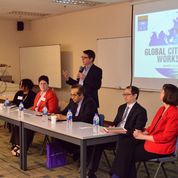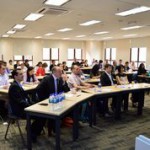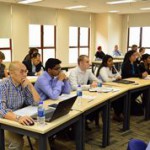
March 31, 2014, by Graham Kendall
Am I agile? Reflections on the U21/KWBN Global Citizenship Employability Roundtable
This is a guest piece from Dr Vanaja Nethi, Programme Professor and Regional Liaison (Asia) for the Fischler School of Education, Nova Southeastern University (NSU) in Florida, USA.
 Being involved in the provision of transnational education in Asia, I was pleased to get the opportunity to attend several sessions of the Universitas 21/Knowledge Without Borders Network Global Citizenship Workshop, 13-14 March at the University of Nottingham Malaysia Campus (UNMC) in Kuala Lumpur.
Being involved in the provision of transnational education in Asia, I was pleased to get the opportunity to attend several sessions of the Universitas 21/Knowledge Without Borders Network Global Citizenship Workshop, 13-14 March at the University of Nottingham Malaysia Campus (UNMC) in Kuala Lumpur.
The terms ‘global citizen’ and ‘global citizenship’ are much bandied-about, both in K-12 (primary and secondary schooling) and in tertiary/Higher Education. Yet the concept is difficult to grasp: there is certainly no clear definition of what it means to be a ‘Global Citizen’, or criteria regarding qualities, skills, knowledge or attributes that one should possess to qualify for your ‘Global Citizen’ passport.
The roundtable session on ‘Careers, Employability and Global Citizenship’, on the second day of the workshop, stimulated much interesting discussion, shedding light specifically on what global citizenship means to university professionals, employers and students. It was chaired by Will Archer, Founder and CEO of i-graduate, who did a fabulous job of facilitating the panel presentations, and moderating a very participative and lively discussion that saw students, employers and academics in the audience sharing their views.
The panel members of the roundtable comprised employers – Datuk Dr Hamzah Kassim, Co-Founder and Group Managing Director, The iA Group, one of the largest consulting firms in Malaysia; Chong Kong Chan, Executive Director of Human Capital, PriceWaterhouseCooper (PwC) Malaysia; Karen Welsh, Education Counselor, Australian Education International; and university professionals from Careers Services and Employability, Nalayini Thambar, University of Nottingham, UK and Eluned Jones, University of Birmingham, UK, and President-Elect of the UK Association of Graduate Careers Advisory Services.
From the employers’ perspective, there was consensus on several key points. First, there was a strong steer that globalization is now accepted as part of the way of life and business, and that students who are immersed in an internationalized education programme are immediately seen as potentially better job candidates. Second, several comments were made about the dynamism and fluidity of the employment market in Asia-Pacific (but also more widely), with quite substantial shifts in focus and needs, even as frequently as every 3-6 months. Third, all the presenters agreed that job candidates needed to exhibit the traits which we had associated with Global Citizenship, such as resilience, agility, and the ability to handle oneself in new and generally intercultural situations. Interestingly, the term ‘Global Citizenship’ had relatively little purchase or resonance, and these attributes were considered fundamental to graduate employability.
 The rather negative and stereotypical image of Generation Y that is often retailed in the media, as a bunch of pampered slackers who wait for things to be handed to them on a platter, is, of course, antithetical to this – and we were relieved to find that the panel didn’t recognize that description. They did, however, make clear that the role of the university is exceptionally important in enabling graduates not only to present themselves effectively, but more fundamentally in the ‘transformative process’ which institutions can provide, offering students myriad opportunities to develop and nurture the key employability traits. These opportunities might include on-campus interaction and engagement with international students (for those who aren’t international students!), travel and study abroad through student exchange and internships, and community engagement.
The rather negative and stereotypical image of Generation Y that is often retailed in the media, as a bunch of pampered slackers who wait for things to be handed to them on a platter, is, of course, antithetical to this – and we were relieved to find that the panel didn’t recognize that description. They did, however, make clear that the role of the university is exceptionally important in enabling graduates not only to present themselves effectively, but more fundamentally in the ‘transformative process’ which institutions can provide, offering students myriad opportunities to develop and nurture the key employability traits. These opportunities might include on-campus interaction and engagement with international students (for those who aren’t international students!), travel and study abroad through student exchange and internships, and community engagement.
One employer stated that he looked for candidates who show that they do things differently – for example, someone who had quit a job to travel around the world would stand out, but only if they were able to explain why they had done that, and what they had gained from the experience. There’s no doubt that competition to recruit top young talent is ferocious, but the panelists felt that there is significant work still to be done with students, from the moment they come into university, to lay the groundwork for understanding and articulating how they can make use of their student experience (academic and extra-curricular) to transform themselves into the kind of talent that employers are looking for.
The perspective of the university career services professionals on the panel was unique because, as part of a consortium of top research universities (Universitas 21 is a global network that has 27 member institutions located in North America, South America, Europe, Asia and Australia), they have the potential to build a platform to share an extraordinary range of resources. There was discussion of how U21 might set up a consortium system so that, potentially, graduating students in one institution would not only have access to employment opportunities from their own career services office, but also all those that reach the offices of any of the other 26 institutions world-wide! That’s a phenomenal resource that has the potential to set apart U21 institutions in terms of employability opportunities they can offer their students. This would also, of course, be very attractive to global employers because the existence of such a system would provide them with a single point of contact to access new graduates globally.
The other interesting input from the careers services professionals related to research that is being done in the UK about the impact of ‘international experience’ on employment choices and employability amongst U21 graduates. This study is still in its infancy, but one great outcome from the event was the opportunity to extend the research into the Asia-Pacific region U21 partners – watch this space!
Finally, arguably the most interesting input was that of the student delegates who indicated that this was the first time they had been able to participate in such a discussion. It was clear that such an opportunity early on in their university program would be useful to help them make the most of their international engagement. They strongly felt the need for better guidance, still more importantly, about how to present their personal growth and transformation as a result of these experiences to potential employers: in one telling intervention, a Concordia/Nottingham student wondered aloud, ‘Am I agile?’ Another important point the students raised was the need to explore strategies to empower students who could not take up opportunities to go abroad: ‘internationalisation at home’ is, after all, the experience of the vast majority of university students, and institutions need to work much harder to support and evaluate this area.
This tri-perspective discussion, allowing for a dialogue among employers, students and university career services professionals, left us all with a number of things to take away. I am particularly interested in the opportunities to extend the employability research into Asia Pacific, and Malaysia specifically. It will also be interesting to see how the member institutions of U21 take the issues raised here into consideration as they work on the consortium’s platform to share resources and global employment opportunities.
Dr. Vanaja Nethi
Fischler School of Education,
Nova Southeastern University
No comments yet, fill out a comment to be the first

Leave a Reply